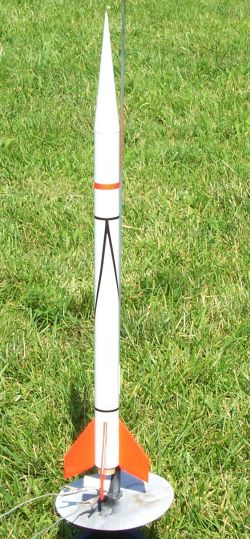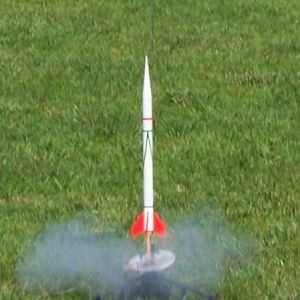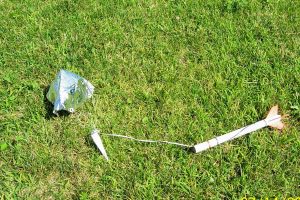Aerospace Speciality Products Sonda II B
Aerospace Specialty Products - Sonda II B {Kit} (KSON-18)
Contributed by Ed Wagoner
| Construction Rating: | starstarstarstarstar |
| Flight Rating: | starstarstarstarstar |
| Overall Rating: | starstarstarstarstar |
| Diameter: | 0.98 inches |
| Length: | 19.25 inches |
| Manufacturer: | Aerospace Specialty Products  |
| Skill Level: | 1 |
| Style: | Scale |

Brief:
The Sonda II B is a 1/12th scale rocket of Brazil's largest sounding rocket of
their Sonda II fleet. The Sonda II B was first flown in the early '70s and is
still in use today. This kit was made by Aerospace Speciality Products (ASP).
Construction:
The kit included the following high quality parts:
- 1 Engine tube (18mm)
- 1 Engine block
- 2 Centering rings
- 1 Body tube
- 1 Balsa fin stock
- 1 Nose cone
- 1 Screw eye
- 1 Nose weight (washer)
- 1 Kevlar® shock cord
- 1 Elastic shock cord
- 1 Launch lug
- 1 Fin template
- 1 Black trim tape
- 1 Parachute kit
The instructions were very well laid out and followed a logical assembly order. The instructions contained many useful diagrams and a lot of assembly tips in the appropriate places. Everything fit well and no special tools were needed.
Construction starts with the tying of the Kevlar® shock cord with a very helpful illustration showing how to tie a knot that forms a loop. Then the motor mount is built and the Kevlar® attached. After installing the Kevlar® to the mount, another loop is tied at the opposite end. These are threaded through the body tube and the mount gets glued in.
Next is the fin template. Cut this out and use it as a guide to cut the four fins from the balsa stock. Square up the fins and use the provided fin marking guide to line them up on the body tube. Also, the guide has the launch lug position marked on it.
The nose cone is balsa. Test fit into the body tube and make sure it fits. Thread the screw eye into the nose cone, remove, fill hole with glue and secure the washer with the screw eye to the nose cone.
The instructions contain many tips on sealing the nose cone and the fins. They also talk about filling the spirals on the BT. This is the only place I deviated from the instructions as I filled the spirals before I started building the rocket.
The parachute was in a separate bag. It is a 12" silver mylar chute. The instructions are superb. The holes must be cut in the chute. This went smoothly by putting the self adhesive discs on each corner and cutting the holes. Attach the shroud line and you are all set.
Finishing:
Painting the rocket was pretty straightforward with tips and illustrations. The
vinyl decals were easy to put on but a bit tricky to get lined up.
While there aren't any CONs that I can see, the PROs on this kit are excellent. With the numerous tips on sealing balsa and the inclusion of filling the body tube seams, the novice modeler can quickly move forward. This kit is rated as a beginner kit and I agree. Also the diagram for masking and painting the rocket is great. It is a very easy kit to build with tips on making it really look good.
Construction Rating: 5 out of 5

Flight:
Thorough flight preparations are in the instructions. Prep with wadding at
least 2 diameters long in the body tube. Fold the chute following the included
technique and put it in the rocket. Make sure the nose cone has a good fit. The
recommended motors are 1/2A6-2, A8-3, B6-4, B8-5, C6-7. Due to the size of the
field where I launch, I choose the A8-3 for the first flight. The motor is
friction fit in place. Great flight I couldn't be happier with this kit.
Recovery:
The Kevlar®
to elastic shock cord is great. The recovery system was quite easy to install
and the 12" silver chute really looked cool in the sun. The rocket came
down at a perfect pace and there was no damage to the rocket or the chute.

Summary:
If you haven't tried out this kit you should. It is great for the beginner but
can be fun for the advanced modeler too. I like all the tips in tricks included
to help the novice modeler move forward and keep the advanced modeler
interested. I can find no faults with this kit.
Overall Rating: 5 out of 5
 |
 |
Flights
Sponsored Ads
 |
 |











